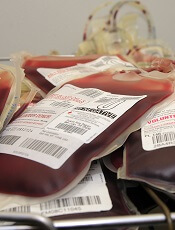
Credit: UAB Hospital
PHILADELPHIA—As the medical community continues to debate whether transfusing older blood has a negative outcome on patients, results of the RECESS trial add fuel to the fire.
The study showed no significant differences in clinical outcomes between cardiac surgery patients who received newer red blood cells (RBCs) and those who received older RBCs.
There were no differences in multi-organ dysfunction scores (MODS), mortality rates, or the incidence of serious adverse events.
Marie E. Stein, MD, of the University of Minnesota in Minneapolis, presented the results of RECESS at the AABB Annual Meeting 2014 (abstract P2-020A).
The findings contradict results from another recent study presented at the Canadian Cardiovascular Congress.
“There are many studies of the effects of red blood cell storage duration on clinical outcomes, most of which are observational and include only a few randomized trials to date,” Dr Stein noted. “When studying cardiac surgery patients, some studies have found significant adverse outcomes of subjects who are transfused with red cells stored for a longer duration compared to shorter duration, and other studies have not.”
“Based on this equipoise, the primary hypothesis for RECESS was that there would be an important difference between the effect of transfusing shorter-storage-age-duration red cells compared to transfusing longer-storage-age-duration red cells on clinical outcomes in cardiac surgery patients.”
Patient characteristics
Dr Stein and her colleagues enrolled 1481 patients who were 12 years of age and older, weighed 40 kg or more, were undergoing complex cardiac surgery, and were considered “highly likely” to be transfused. They had to have a TRUST score of 3 or greater if they were older than 18 years of age, but this was not required for children.
Patients were split into two groups: those set to receive RBCs stored for 10 days or fewer and those set to receive RBCs stored for 21 days or more. Patients were stratified by age (those 12 to 17 years vs patients 18 and older) and according to whether they were in the intensive care unit prior to surgery. They were balanced by site as well.
In all, there were 538 subjects evaluable for the newer RBC arm and 560 subjects evaluable for the older RBC arm. (Subjects were evaluable if they underwent surgery and received at least 1 RBC unit.) The median patient age was 73 and 72 years, respectively, and males made up 42% and 44% of the patients, respectively.
The same percentage of patients in each arm—96%—underwent cardiopulmonary bypass, and 23% of patients in each arm underwent coronary artery bypass grafting. Seventeen percent of patients in the newer RBC arm and 14% in the older RBC arm underwent valve surgery only.
“Red cells were leukoreduced, stored in additive solution, and provided according to storage duration arm assignment for all pre-op, post-op, and intra-operative transfusions through day 28, discharge, or death, whichever occurred first,” Dr Stein noted.
The number of RBC units did not differ significantly between the two arms (P=0.80), and there was a comparable number of highly transfused subjects in each arm (P=0.81).
Eighty-seven percent of patients in the newer RBC arm and 89% in the older RBC arm received all their RBC units as assigned (P=0.35).
Six percent and 8%, respectively, received 1 or more unit aged 11 to 20 days but none belonging to the opposite arm to which they were assigned. Five percent and 4%, respectively, received 1 or more RBC unit from the opposite arm to which they were assigned.
“There was a 20-day difference in the mean storage duration between the two arms: 8 vs 28 days,” Dr Stein pointed out.
Outcomes
The study’s primary outcome was the change in multi-organ dysfunction score (ΔMODS) at 7 days. The MODS system includes assessments of respiratory, renal, hepatic, cardiovascular, hematologic, and neurologic function.
“The MODS system was chosen as the primary endpoint because the data elements are objective and readily available,” Dr Stein said. “MODS also incorporates organ dysfunction and not just frank organ failure. It correlates with mortality, with length of stay, and does incorporate death. MODS has been validated in other studies and has been used in other transfusion trials, including TRICC.”
To calculate 7-day ΔMODS, the researchers identified the worst score for each organ system through day 7 after surgery, discharge, or death. The 7-day MODS was the sum of the worst score for each organ system, and the 7-day ΔMODS was the pre-surgery MODS subtracted from the 7-day MODS.
Secondary outcomes were the 28-day ΔMODS, 28-day mortality, and the incidence of serious adverse events.
There was no significant difference between the arms with regard to 7-day or 28-day ΔMODS.
For the 7-day ΔMODS, the mean was 8.5±3.6 in the newer RBC arm and 8.7±3.6 in the older RBC arm. The unadjusted difference and the difference adjusted for baseline MODS were both -0.02.
For the 28-day ΔMODS, the mean was 8.7±4.0 in the newer RBC arm and 9.1±4.2 in the older RBC arm. The unadjusted difference and the difference adjusted for baseline MODS were both -0.3.
There was no significant difference between the arms in time to death (P=0.50), 7-day mortality (P=0.43), or 28-day mortality (P=0.57). The rate of 7-day mortality was 2.8% in the newer RBC arm and 2.0% in the older RBC arm. The 28-day mortality was 4.4% and 5.3%, respectively.
There was no significant difference in the percentage of subjects with 1 or more serious adverse events. The rate was 53% in the newer RBC arm and 51% in the older RBC arm (P=0.72).
Taking these results together, Dr Stein concluded that differences in the storage duration of RBCs did not translate to significant differences in “key clinical outcomes.”


